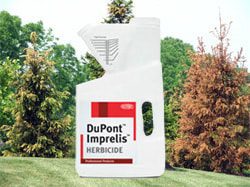
DuPont says it could end up paying millions of dollars to compensate property owners who lost trees to its now-banned Imprelis herbicide. According to a report from The New York Times, some 30,000 Imprelis tree damage claims have been submitted to DuPont by homeowners, golf courses, municipalities and landscapers throughout the U.S. As we’ve reported […]
 DuPont says it could end up paying millions of dollars to compensate property owners who lost trees to its now-banned Imprelis herbicide. According to a report from The New York Times, some 30,000 Imprelis tree damage claims have been submitted to DuPont by homeowners, golf courses, municipalities and landscapers throughout the U.S.
DuPont says it could end up paying millions of dollars to compensate property owners who lost trees to its now-banned Imprelis herbicide. According to a report from The New York Times, some 30,000 Imprelis tree damage claims have been submitted to DuPont by homeowners, golf courses, municipalities and landscapers throughout the U.S.
As we’ve reported previously, Imprelis was banned last August, after data provided by DuPont confirmed that certain coniferous trees, including Norway spruce, white pine and balsam fir, were susceptible to being damaged or killed by the application of Imprelis. The herbicide, which was only approved by the U.S. Environmental Protection Agency in October 2010, was supposed be an environmentally safe solution for controlling broadleaf weeds. But according to The New York Times, some expert believe that as many as 100,000 trees may have died due to Imprelis.
Rik Miller, DuPont’s president for crop protection, told the Times the company is aiming to have compensation offers out to half of the Imprelis claimants by the end of July and hopes to complete the process by the fall. DuPont has said it set aside $225 million claims already submitted, and that the payout could eventually reach $575 million.
Some property owners told the Times that they were frustrated by the way the company was handling the Imprelis claims process.
“We’re hearing nothing,” said Janet DaPrato of Columbus, Ohio, who had two trees die last year and has had two more die since. “We put in a claim for two trees, and now the problem is getting worse.”
In order to be eligible for compensation, claimants must leave their dead trees standing – some as high as 50ft – on their property until DuPont sends an inspector to examine them. And while DuPont says it will compensate for even the largest trees, realistically it’s likely that replacement trees will only measure 12 to 16 feet high.
DuPont is also facing a massive Imprelis class action lawsuit that includes thousands of property owners and landscapers in Philadelphia federal court.
According to the Times, it’s also highly likely that neither DuPont nor property owners have reached the end of the Imprelis nightmare.
“There may be damage that has yet to be discovered,” Bert Cregg, an associate professor of tree physiology at Michigan State University, told the Times. “Some trees look worse this year.”


